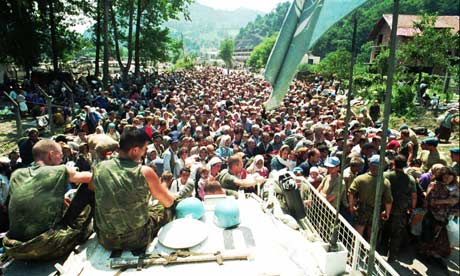 |
| "Dutch UN peacekeepers watch while Muslim refugees from Srebrenica gather in the village of Potocari in 1995." (Associated Press) |
By Ian Traynor
The Guardian, July 5, 2011
"Relatives of the victims of Europe's biggest massacre in decades won a landmark case, immense satisfaction, and the likelihood of substantial damages when a Dutch appeals court ruled for the first time that the Netherlands had to answer for the deaths of Muslim men at Srebrenica 16 years ago. The verdict stunned the Dutch government as well as the plaintiffs, who have campaigned on the issue for more than a decade and had almost given up. If the ruling is upheld by the supreme court, there could be hundreds of claims for damages from relatives from some of the estimated 8,000 Bosnian Muslim males butchered by the Bosnian Serb forces under General Ratko Mladic, on trial at the war crimes tribunal in The Hague on charges of genocide. The verdict also found for the first time that countries contributing to a UN peacekeeping mandate must answer for their actions and cannot enjoy immunity behind a UN cloak. The court rejected the Dutch government's argument that it was not responsible for its troops stationed in Srebrenica as they were under UN authority. 'It has been established that states who take part in UN peacekeeping operations cannot not be responsible for their actions. It's all about effective control,' Liesbeth Zegveld, the lawyer for the two Bosnian plaintiffs, told the Guardian. Hasan Nuhanovic, whose parents and brother were killed at Srebrenica, and the relatives of Rizo Mustafic, who worked as an electrician for the Dutch and was killed, have campaigned for years to get the UN and the Netherlands to bear partial blame for the atrocities on the grounds that at the time Srebrenica, in eastern Bosnia, was a UN-declared 'safe haven' manned by Dutch troops serving with the UN. The court ruled that the Dutch state was responsible for those deaths.
A Dutch court rejected the plaintiffs' arguments in 2008, ruling that the Netherlands could not be held responsible as the Dutch troops were under UN authority. A parallel case ruled that the UN was immune to prosecution. The appeal court verdict stunned the Dutch government and even blindsided the litigants. 'This comes as a surprise. We will have to study the ruling and then decide on our next steps,' said a Dutch defence ministry spokesman. Nuhanovic, the Bosnian Muslim who was the prime mover in the eight-year case, was taken aback. 'I wouldn't say I'm happy,' he told the Guardian. 'But I wasn't prepared for this. I've had so many difficulties. The Dutch state completely denied responsibility for this.' [...]"














No comments:
Post a Comment
Please be constructive in your comments. - AJ